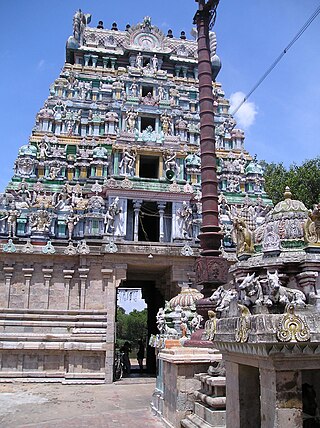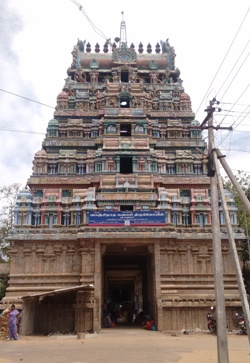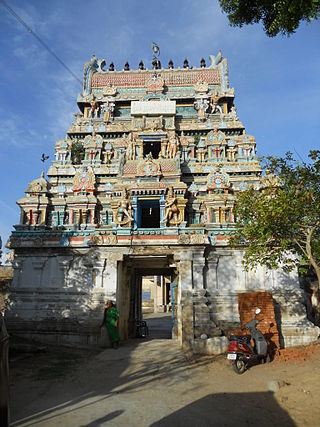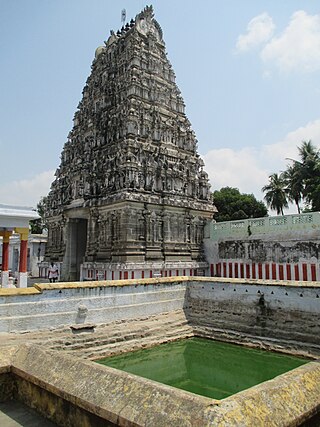
Tiruvalithayam Tiruvallesvarar Temple is a temple dedicated to the Hindu deity Shiva, located at Padi, a north-western neighbourhood of Chennai, India. Shiva is worshiped as Tiruvalleswarar, and is represented by the lingam and his consort Parvati is depicted as Jagadambiga. The presiding deity is revered in the 7th century Tamil Saiva canonical work, the Tevaram, written by Tamil poet saints known as the nayanars and classified as Paadal Petra Sthalam.

Thiruvathigai Veerateswarar Temple is a Hindu temple dedicated to Shiva. It is situated in Thiruvathigai village which is about 2 kilometres east from the town of Panruti in the South Indian state of Tamil Nadu, India. Shiva is worshiped as Veerattaaneswarar, and is represented by the lingam. His consort Parvati is depicted as Thiripurasundari. The presiding deity is revered in the 7th-century Tamil Saiva canonical work, the Tevaram, written by Tamil saint poets known as the nayanars and classified as Paadal Petra Sthalam. The temple is considered the place where the Saiva saint poet Appar (Thirunavukkarasar) converted back to Saivism, and attained final salvation.

Kalyanasundaresar Temple, Nallur or Thirunallur is a Hindu temple dedicated to the deity Shiva in Nallur, Tamil Nadu, India. It is located 10 km (6.2 mi) away from Kumbakonam, 6 km (3.7 mi) east of Thirukkarugavur, and 30 km (19 mi) south of Thanjavur.

Vanchinadha Swamy temple is a Hindu temple dedicated to the deity Shiva, located in Srivanchiyam, Tiruvarur District, Tamil Nadu, India. Shiva is worshiped as Vanchinadha Swamy, and is represented by the lingam. His consort Parvati is depicted as Mangalambigai Amman. The presiding deity is revered in the 7th century Tamil Saiva canonical work, the Tevaram, written by Tamil saint poets known as the Nayanmars and classified as Paadal Petra Sthalam.

Prananadeswarar Temple is a Hindu temple dedicated to Shiva located in Thirumangalakudi in Mayiladuthurai district of Tamil Nadu, India. Shiva is worshiped as Prananatheswarar, and is represented by the lingam and his consort Parvati is depicted as Mangala Nayagi. The presiding deity is revered in the 7th century Tamil Saiva canonical work, the Tevaram, written by Tamil poet saints known as the nayanars and classified as Paadal Petra Sthalam.

Nadutariappar Temple, Kanrappur is a Hindu temple dedicated to Shiva located at Kanrappur near Tiruvarur, Tamil Nadu, India. The temple is incarnated by the hymns of Appar and is classified as Paadal Petra Sthalam.

Padikasu Nathar Temple is a Hindu temple located at Azhagaputhur, a village in the Thanjavur district of Tamil Nadu, India. Shiva is worshiped as Padikasunathar, and is represented by the lingam. His consort Parvati is depicted as Soundaranayagi. The presiding deity is revered in the 7th century Tamil Saiva canonical work, the Tevaram, written by Tamil saint poets known as the nayanars and classified as Paadal Petra Sthalam. The 8th century Saiva saint poet Sundarar has sung praise about the temple in his works.

Sivapuri Uchinathar Temple is a Hindu temple located at Sivapuri in Cuddalore district of Tamil Nadu, India. The place is also known as Thirunelvayil. The presiding deity is Shiva. He is called as Uchinathar. His consort is known as Uchinayagi.

Tirukkazhippalai Palvannanathar Temple is a Hindu temple located at Sivapuri in Cuddalore district of Tamil Nadu, India. The presiding deity is Shiva in the form of Palvannanathar and his consort is known as Vedanayaki. The presiding deity is revered in the 7th century Tamil Saiva canonical work, the Tevaram, written by Tamil saint poets known as the nayanmars and classified as Paadal Petra Sthalam.

Innambur Ezhutharinathar Temple is a Hindu temple dedicated to Shiva, located in Innambur, a village in the outskirts of Kumbakonam, in Thanjavur district in Tamil Nadu, India. Shiva is worshipped as Ezhutharinathar and his consort Parvati as Nithya Kalyani. Ona Kantheeswarar is revered in the 7th century Tamil Saiva canonical work, the Tevaram, written by Tamil saint poets known as the Nayanars and classified as Paadal Petra Sthalam, the 275 temples revered in the canon.

Tiruppaatrurai Adhimooleswarar Temple is a Hindu temple dedicated to Shiva (Adhimooleswarar) located at Tirupattrurai in Trichy district of Tamil Nadu, India. The historical name of the place is Tirupalathurai. The temple is revered in the 7th century Tamil Shaiva canon, the Tevaram, written by the Tamil Nayanar saint-poets and thus classified as Paadal Petra Sthalam.

Ambal Brahmapureeswarar Temple(அம்பல் பிரமபுரீசுவரர் கோயில்) is a Hindu temple located at Ambal in Tiruvarur district, Tamil Nadu, India. Now the place is known as Koilpatthu. The presiding deity is Shiva. He is called as Brahmapureeswarar. His consort is known as Poonkuzhalammai. The historical name of the place is Punnakavanam. Shiva is worshipped as Brahmapureeswarar and his consort Parvathi as Poonguzhalammai. Ampal Brahmapureeswarar is revered in the 7th century Tamil Saiva canonical work, the Tevaram, written by Tamil saint poets known as the Nayanmars and classified as Paadal Petra Sthalam, the 275 temples revered in the canon. The temple is believed to be the last among the sixty maadakoil built by Kochengat Chola.

Anekadhangavadeswarar Temple is a Hindu temple dedicated to Shiva, located in the town of Kanchipuram, near Kailasanathar temple, Kanchipuram district in Tamil Nadu, India. Anekadhangavadeswarar is revered in the 7th century Tamil Saiva canonical work, the Tevaram, written by Tamil saint poets known as the nayanars and classified as Paadal Petra Sthalam, the 275 temples revered in the canon.

Metraleeswarar Temple is a Hindu temple dedicated to Shiva, located in Pillaiyar Palayam area in Kanchipuram, Kanchipuram district in Tamil Nadu, India. Metraleeswarar is revered in the 7th-century CE Tamil Saiva canonical work, the Tevaram, written by Tamil saint poets known as the nayanars and classified as Paadal Petra Sthalam, the 275 temples revered in the canon. The temple is believed to have expanded during the 13th century by Later Cholas as indicated in the inscriptions.

Thirumakaraleeswarar Temple is a Hindu temple dedicated to the deity Shiva, located in Magaral, a village in Kanchipuram district in the South Indian state of Tamil Nadu. Shiva is worshipped as Thirumakaraleeswarar, and is represented by the lingam. His consort Parvati is depicted as Tribuvananayagi. The presiding deity is revered in the 7th-century CE Tamil Saiva canonical work, the Tevaram, written by Tamil saint poets known as the Nayanmars and classified as Paadal Petra Sthalam.

Marundeeswarar Temple is a Hindu temple dedicated to the deity Shiva, located in T. Edaiyar, a village in Viluppuram district in the South Indian state of Tamil Nadu. Shiva is worshipped as Marundeeswarar, and is represented by the lingam. His consort Parvati is depicted as Balambigai. The temple is located on the Southern banks of Thenpennai River on the Thirukoilur - Thiruvennainallur road. The presiding deity is revered in the 7th century Tamil Saiva canonical work, the Tevaram, written by Tamil saint poets known as the nayanmars and classified as Paadal Petra Sthalam.

Vaseeswarar Temple is a Hindu temple dedicated to the deity Shiva, located in Thirupasoor, a village in Tiruvallur district in the South Indian state of Tamil Nadu. Shiva is worshiped as Vaseeswarar, and is represented by the lingam. His consort Parvati is depicted as Pasupathinayagi. The temple is located on the Southern banks of Poondi reservoir on the Thiruvallur - Thiruthani road, 5 km (3.1 mi) away from the town. The presiding deity is revered in the 7th-century CE Tamil Saiva canonical work, the Tevaram, written by Tamil saint poets known as the nayanmars and classified as Paadal Petra Sthalam.

Agnipureeswarar Temple in Thirupugalur, a village in Nagapattinam district in the South Indian state of Tamil Nadu, is dedicated to the Hindu god Shiva. Constructed in the Tamil style of architecture, the temple is believed to have been built during the Cholas period in the 10th century. Shiva is worshipped as Agnipureeswarar and his consort Parvathi as Karundar Kuzhali. The temple is believed to be the place where Saiva saint Appar is believed to have attained salvation.

Oondreswarar Temple is a Hindu temple dedicated to the deity Shiva, located in Poondi, a village in Tiruvallur district in the South Indian state of Tamil Nadu. Shiva is worshiped as Oondreswarar, and is represented by the lingam. His consort Parvati is depicted as Minnoli Amman. The temple is located on the Northern banks of Poondi reservoir on the Thiruvallur - Thiruthani road, 11 km (6.8 mi) away from the town. The presiding deity is revered in the 7th-century CE Tamil Saiva canonical work, the Tevaram, written by Tamil saint poets known as the Nayanmars and classified as Paadal Petra Sthalam.

Pushpavaneswarar temple in Thirupuvanam, a town in Sivaganga district in the South Indian state of Tamil Nadu, is dedicated to the Hindu god Shiva. Constructed in the Dravidian style of architecture, the temple is believed to have been built during the Cholas period in the 7th century. Shiva is worshipped as Pushpavaneswarar and his consort Parvathi as Soundaranayagi.





















